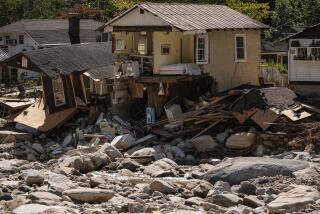Discord Grows Over Handling of Hurricane Aid
The controversy over the Nicaraguan government’s handling of a Los Angeles hurricane aid shipment has snowballed into questions about the consul general’s management of tens of thousands of dollars in donations.
Contending that the government of Nicaragua suffers from a crisis of credibility, several members of Los Angeles’ Nicaraguan community demanded in a letter that Consul General Silvio Mendez disclose the names of donors and specify how much money he raised after Hurricane Mitch racked Central America last fall. Releasing the information, the letter says, would help allay concerns about whether government aid has reached victims.
“What does he have to hide?” asked Gloria Marin, one of those who signed the March 18 letter sent to Mendez and officials in Nicaragua. Marin helped obtain a Culver City warehouse to store donated items but quit the consul’s relief team in December because of frustration over delays in shipping the aid.
Mendez said late Tuesday that he received more than $40,000 in hurricane relief checks and that he can account for all the money. However, he declined to publicly provide documentation identifying the donors or detailing his handling of the funds.
The checks were deposited in a Los Angeles bank account controlled by the consulate and were transferred to a government account in Nicaragua, Mendez said. Asked if any of the money was used for hurricane relief, he answered, “I don’t know.”
The consul last month used a separate fund to ship 28 cargo containers that had been stranded here for more than three months because he said he lacked money. All but three of those containers, which arrived in Nicaragua 27 days ago, were still piled up at the Port of Corinto on Wednesday afternoon.
Mendez had promised that the food, medicine and other essentials collected in Los Angeles would be handed out immediately by the Catholic Church after the shipment arrived in Nicaragua. Instead, the 675-ton cargo has ended up in the hands of a social services operation run by Maria Dolores Aleman, the daughter of Nicaragua’s president. The containers have not been moved, the consul said, because Aleman is having logistical problems. But he insisted that the supplies would soon be sent to hurricane-hit areas.
Some of the Los Angeles relief items may have been damaged after large amounts of bottled water apparently broke inside two of the cargo containers. The port’s director said the ruptures last week may have been caused by the pressure of the metal containers being stacked on top of one another for such a long time.
After the shipment arrived, only three containers, with $30,000 worth of Simmons mattresses, were moved off the docks. Aleman gave the mattresses to needy hospitals in Managua. Officials of Compton-based Simmons complained that Mendez had promised them that the donations would go to “victims of this disaster only.”
Mendez had appealed for donations shortly after the storm struck Nicaragua, killing 3,000 people and leaving 40,000 homeless.
As donated goods piled up, dissension broke out among members of Mendez’s operation over relief checks.
According to three people who attended a tense meeting in early December, Mendez said he had received thousands of dollars in donations. But the consul said the money could not be used to send supplies that had already filled two warehouses.
“Everybody was shocked,” Martin recalled. “We were very angry at him because things had not been shipped.”
Frustrated, a number of volunteers abandoned Mendez. One of them was the Nicaraguan vice consul, Maria Arguello, who said she resigned her post last January in part because she was upset with the way Mendez had handled the aid. She declined to elaborate.
Mendez said his hands were tied by Nicaraguan government regulations that prevented him from using any of the donations for shipping the containers. “I could not touch that money,” he said.
The containers were finally shipped to Nicaragua after a Times article in late January helped raise about $30,000 for a separate transportation fund.
The $40,000 in relief checks that Mendez received were deposited in a Sumitomo Bank of California account that he and another staffer controlled. The consul said the money was regularly transferred to the Nicaraguan Central Bank and that the last of the funds were sent about two weeks ago.
During the same time that donations were reaching the Nicaraguan Consulate late last year, other contributions went to the local consulate of Honduras, another nation hit hard by Hurricane Mitch.
Consul General Vivian Panting said that about $70,000 in relief checks were deposited in an account administered by three people who do not work at the consulate.
Panting said the money was transferred to the office of Honduras’ first lady, who is helping oversee relief efforts. The consul said she expected to receive a report next week detailing how the money was used.
Members of Los Angeles’ Nicaraguan community say that Mendez has an obligation to disclose everything about the money he collected.
“That information is public,” said Manuel Mena, editor of Monimbo, a Los Angeles newspaper that covers issues affecting Nicaragua and its expatriates.
Mendez said he is not obligated to give out any details, especially to the authors of the letter.
He said he is overwhelmed with administrative duties but pledged that he would eventually find out where the money went and privately inform individual donors.
“Everybody who gave money to this consulate will know what happened with their money,” he said.
Times librarian Scott Wilson contributed to this story.
More to Read
Sign up for Essential California
The most important California stories and recommendations in your inbox every morning.
You may occasionally receive promotional content from the Los Angeles Times.











